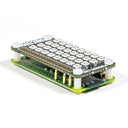Pogo-a-go-go Solderless GPIO Pogo Pins
by Pimoroni



Fit a pHAT fiddle-free! These solderless pogo GPIO pins, nuts, bolts, and spacers make fitting a pHAT to your Pi Zero (or Zero W) super-quick and easy. Pogo-a-go-go!
Pogo pins are springy and normally used for test jigs (we use them for this in the workshop), but it turns out they make a super-simple way to fit pHATs to Pi Zeros, no tools required! We've had these ones specially engineered so that they're just the right size to give a reliable electrical contact between Pi Zero and pHAT.
Because they're non-permanent, you can easily switch them around between different projects, no hassle. If you're brave and gentle, you can use just the two mounting holes closest to the header and make this kit stretch to two Pi Zeros and pHATs (assuming they use less than ten pins in total).
Kit includes
- 10x pogo GPIO pins
- 4x M2.5x12mm white nylon bolts
- 4x M2.5x7mm white nylon spacers
- 5x M2.5 white nylon nuts
Instructions
- Find the pins used by the board you want to fit at pinout.xyz
- Pop the four bolts through your Pi's mounting holes from below
- Slide on the four spacers
- Sit the pins with the short end in the Pi's GPIO, in the appropriate holes
- Pop the pHAT on top
- Secure with the four nuts
Notes
- Most of our pHATs use less than 10 GPIO pins but, for some like Automation pHAT, pHAT BEAT, and Explorer pHAT, you may need more than 10 pins!
- Small parts may be a choking hazard. Keep away from children three years old and younger. This is not a toy!
- Pin length: ~9.5mm when extended, ~7mm compressed
- Pi Zero W and Unicorn pHAT not included in kit
-
Pogo-a-go-go Solderless GPIO Pogo Pins
PIM330£5.75
Shop with confidence – we've been serving the hobbyist electronics, Maker, and retro gaming communities since 2012.
- Satisfaction or refund guarantee
- Worldwide shipping via mail or courier
- 57,000+ customer reviews
- Secure website and payments

